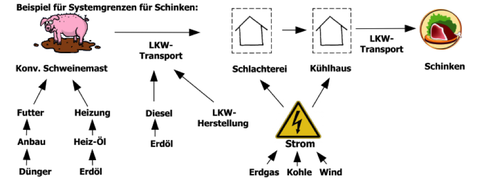Re-calculation of carbon footprints of canteen food at the TU Dresden
Table of contents
In the context of the "Klimawoche 2010" (Climate Week 2010) at the TU Dresden, the ecological impacts of canteen food were calculated for the first time. They were displayed and broken down with the carbon footprint for each offering of the day. In cooperation with the TUUWI AG mensa universale and the Studentenwerk Dresden, it was arranged that visitors to the Mensa Bergstraße were served not only a meal on their tray, but also the resulting CO2-emissions. This initiative gained a lot of positive feedback - from the visitors as well as from the organisers - and was therefore carried out again for the for the "Evangelischer Kirchentag" (German Protestant Church Congress) as well as for the "umundu-Wochen".
Around 1.35 t CO2 per year, or 3.5 kg CO2 per day, are caused by the average German citizen solely by their food intake. If a meal exceeds half of this "daily budget" of nutrition, the carbon “foot” is displayed in red.
For the calculation of the carbon footprint it is necessary, in terms of a life cycle approach, to include processes such as the cultivation of the vegetables, any further processing, and the cold chain. The energy consumption and other emissions resulting from these processes are added up for the entire life cycle until the meal reaches the plate in the canteen. The cooking process, however, may not yet be looked at, since the data so far is not reliable enough. The database PROBAS from the Umweltbundesamt (German Federal Environmental Agency) provides the necessary data for the calculation. The following figure roughly depicts the life cycle approach using the example of manufacturing ham:
In 2011 the "Dresdner Carbon Footprint" was nominated for the "Sächsischer Umweltpreis" (Saxon environment prize) and made it to the final round as one of the four nominated projects for the category "Herausragende Leistungen auf dem Gebiet der Umweltbildung sowie herausragendes ehrenamtliches Engagement für den Umwelt- und Naturschutz" (Outstanding performances in the area of environmental education as well as outstanding honorary engagement for environmental and nature protection).
With the help of results from regular seminars, it should be possible to permanently provide data for the carbon footprint in the future. This enables the continuous calculation of daily menus. The project can be seen as a pilot project, but so far there has not been a similar concept for presenting climate-relevant emissions from daily meals at any other German college or university
Leadership
Researcher
- Christian Manthey, M.Sc.
Term
- 04/2010 - 12/2013
Publications
- Manthey, C.; Bergheim, K.; Gerlach, Y.; Grasshoff, N.; Plischtil, M.: Carbon Footprint in Canteen Kitchens - Calculation of Carbon Foodprints at a University. In: Pillmann, W.; Schade, S. ;Smits, P. (Hrsg.): EnviroInfo 2011 - Innovations in Sharing Environmental Observation and Information, Proceedings of the 25th International Conference on Informatics for Environmental Protection Ispra, Italy.
Presentations
- Carbon Footprint in Canteen Kitchens - Calculation of Carbon Foodprints at a University. Vortragim Rahmen der EnviroInfo in Ispra, Italien am 5.10.2011 (Christian Manthey)

